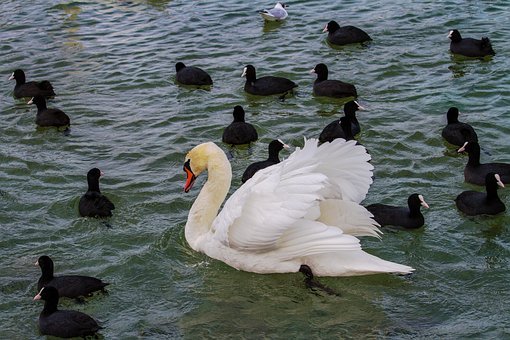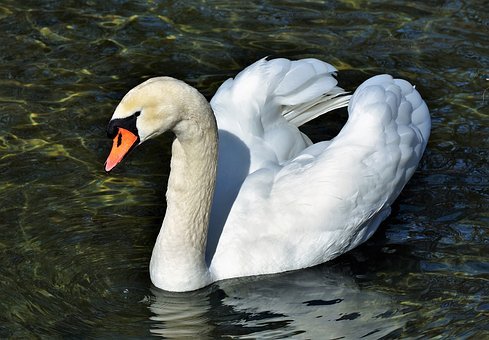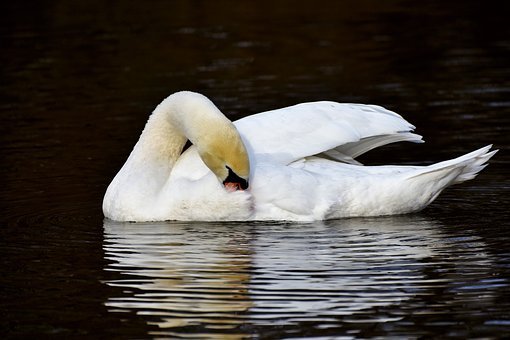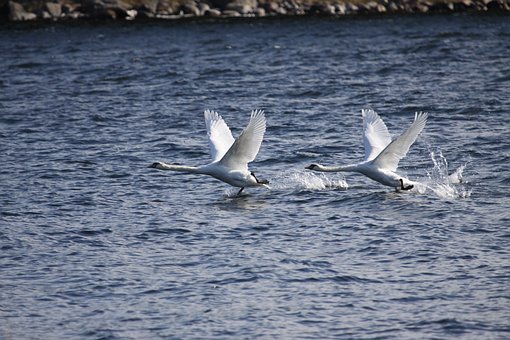"Swans are symbols of beauty and grace on many levels - associated with love, poetry and music. In Roman mythology Swan was sacred to Venus, the goddess of love. In Greek tradition, this bird was often pictured singing to a lyre [x]. The male swan, called the cob, helps the female, known as a pen, to look after their babies, called cygnets until they are a year old. The young don't spend more than one day in the nest once they hatch.[y]"
[src] Swans living on fresh water will typically eat pondweed, stonewort and wigeon grass, as well as tadpoles and insects such as milfoil. Swans living on salt water will typically eat sea arrow grass, salt marsh grass, eel grass, club rush and green algae, as well as insects and molluscs.[z]
Due to their large size, swans have few natural predators in the wild. The swan's main predator is the human who hunts the swan for its meat and it's feathers. Other predators of the swan include wolves, raccoons and foxes they prey both on the swan itself but also on it's eggs.w. Trumpeter Swans (Great Lake Habitant) breed in freshwater marshes, ponds and lakes. They require large areas of shallow water (one to three feet deep) that produce the vegetation required for nesting and foodH
[src]people like feeding bread to swans, but when it's fed in large quantities, it can cause dietary problems, and is no substitute for the proper diet that the birds themselves will seek out. Grain, such as wheat, and vegetable matter, especially lettuce and potatoes, can be fed to swans.k. In April 2010, a swan on the River Cam in England made the news after repeatedly attacking rowers. "If you approach a swan nest on the river, they might get aggressive and hiss and flap their wings, but the danger is over-rated and it's a myth that they will break your leg or arm with their wings.L. They live for approximately 20 to 30 years. Some variations exist between the more common swan species. The trumpeter swan, which is the largest swan in North America, lives for an average of 24 years in the wild but has been known to live for 33 years in captivity.D
[swan]
Swans living on fresh water will typically eat pondweed, stonewort and wigeon grass, as well as tadpoles and insects such as milfoil. Swans living on salt water will typically eat sea arrow grass, salt marsh grass, eel grass, club rush and green algae, as well as insects and molluscs.[z]
Due to their large size, swans have few natural predators in the wild. The swan's main predator is the human who hunts the swan for its meat and it's feathers. Other predators of the swan include wolves, raccoons and foxes they prey both on the swan itself but also on it's eggs.w. Trumpeter Swans (Great Lake Habitant) breed in freshwater marshes, ponds and lakes. They require large areas of shallow water (one to three feet deep) that produce the vegetation required for nesting and foodH
[src]people like feeding bread to swans, but when it's fed in large quantities, it can cause dietary problems, and is no substitute for the proper diet that the birds themselves will seek out. Grain, such as wheat, and vegetable matter, especially lettuce and potatoes, can be fed to swans.k. In April 2010, a swan on the River Cam in England made the news after repeatedly attacking rowers. "If you approach a swan nest on the river, they might get aggressive and hiss and flap their wings, but the danger is over-rated and it's a myth that they will break your leg or arm with their wings.L. They live for approximately 20 to 30 years. Some variations exist between the more common swan species. The trumpeter swan, which is the largest swan in North America, lives for an average of 24 years in the wild but has been known to live for 33 years in captivity.D
[swan] Swans used to be eaten by the aristocracy up to Tudor/Elizabethan ages. They ceased to be a popular dish when all swans in England were declared the property of the monarch, so catching one to eat could result in a short (or not so short) stay in the tower. Two livery companies have been granted a special dispensation to own swans, hence the annual 'swan-upping' sessions. During these, representatives of the two companies are allowed one day to catch swans and mark them with either one or two notches on their beaks. Any unmarked birds remain the property of the monarch.
Swans used to be eaten by the aristocracy up to Tudor/Elizabethan ages. They ceased to be a popular dish when all swans in England were declared the property of the monarch, so catching one to eat could result in a short (or not so short) stay in the tower. Two livery companies have been granted a special dispensation to own swans, hence the annual 'swan-upping' sessions. During these, representatives of the two companies are allowed one day to catch swans and mark them with either one or two notches on their beaks. Any unmarked birds remain the property of the monarch.
Susie Burlace, London. xx
[swan]









Dear friend, you do not appear to be following @artzone. Follow @artzone to get a valuable upvote on your quality post!
Following you now.
Hello! I find your post valuable for the wafrica community! Thanks for the great post! @wafrica is now following you! ALWAYs follow @wafrica and use the wafrica tag!
Thank you for your support.